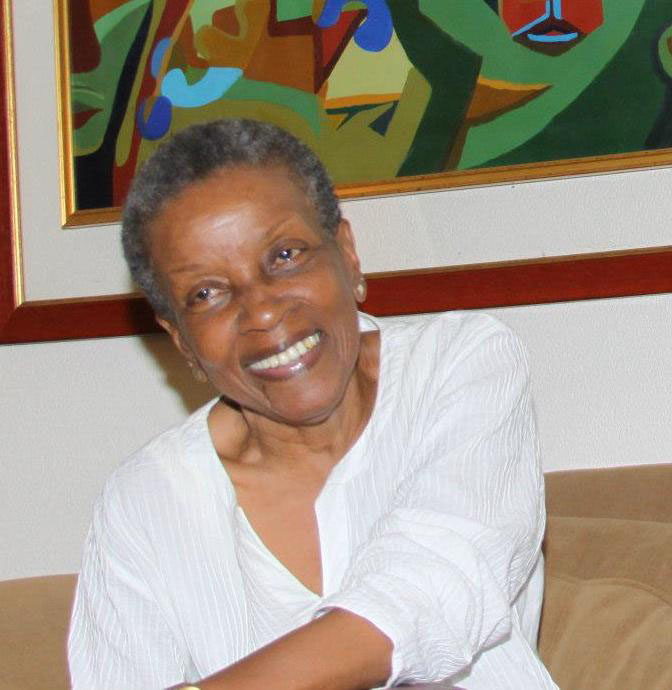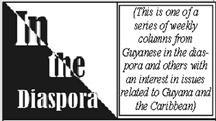Note by Alissa Trotz, Diaspora Column Editor: On Friday May 31, Guyanese social activist Andaiye died. She was 77 years old. Hers was the life, as Karen de Souza simply said, of a remarkable human being. Andaiye had just completed an anthology of her writings and speeches over 50 years of activism, which, like Walter Rodney’s History of the Working People 1881-1905, will be published posthumously. Titled The Point is to Change the World, Andaiye describes the collection as “meant for activists mainly but not only in the Caribbean and Caribbean diaspora, young and older, for whom the point is to change the world…because I hope it can contribute to their organizing.”
We have received an outpouring of grief that reflects Andaiye’s internationalist outlook, and have created a website to host and where people can continue uploading tributes: http://andaiye1942-2019.com/
This week’s column, for young people, is given over to Andaiye’s words.
Between 1997-2000, in the midst of battling chronic illness, Andaiye edited a column in the Stabroek News called Woman’s Eye View (just earlier this year she was toying with the idea of restarting a newspaper column); in fact in 1998, Sara Abraham and I contributed an early article on race in Guyana, an experience that laid the seed for what would become the diaspora column ten years later. Andaiye’s practice was to hold space for other contributors; one was Vidyaratha Kissoon, who over the weekend visited the National Library, and who suggested this week’s Woman’s Eye View article, first published in the Stabroek News Sunday November 30, 1997 edition.
Last week in hospital, Andaiye began a discussion about what should be done with her writing that did not make it into the anthology. She emphasised that insofar as the Woman’s Eye View articles went, she now found some of them “unbearably stupid” and wanted that to be said publicly. If any were to ever be republished, one other person at least needed to be shown, someone whose opinion she trusted.
So Andaiye, this one’s for you. Vidya suggested it, and Karen de Souza and Vanda Radzik agreed this one was worthy of republication.
Thank you. For everything. And, as Walter Rodney (and you, in your anthology) have said of Eusi Kwayana, and we now say of you, thank you for example.
***
I have been thinking a lot recently about what I would do if I were a young person in today’s Guyana. I thought about it some more a few weeks ago when I was asked, along with people who belong to other political parties, to talk to a youth conference about “empowering youth”.
As I said at the start of my talk to that conference, if you want to talk about “empowering” any group of people, it is because you believe or know that something is taking power away from that group. So the young people at the conference who decided on the topic of “empowering youth” were young people who believe or know that something is getting in their way.
For me, then, the first question is, what are the factors that stop young people in Guyana today from developing or using their power. I want to begin my contribution to answering that question by talking about what, in my generation, robbed us of power.
When I was a child, Guyana was still a British colony. In those days, many things conspired to rob young people of power
1. For many youth, one thing was the effects of poverty. This doesn’t mean that poor people are without power; it means that poverty can have the effect of disempowering you. For example, in my generation, being poor meant that you didn’t go to secondary school or university except if you got a scholarship. since secondary school and university (university being overseas) weren’t free.
Or it could mean irregular attendance at school because you had to help look after the younger children at home, or help your parent with work on the small family farm.
2. For most youth, a second factor was how attitudes to race and gender (this last one means how people are treated as males or females) could make you feel inferior; girls were often treated as less important than boys and then too, were subjected to a kind of sexual disrespect and violence; and certain race groups were treated as lower than other race groups because of skin colour and hair or how much education you had or how you spoke English or whether you wore “correct” clothes – and the further away you were in skin colour and hair and speech and clothes from the English, the more inferior you were. I was well into my adult years before I realised that in the world of my youth, the majority of people in Guyana had been made to feel bad about themselves.
3. For almost everybody, a third factor was the widespread teaching that people stay in their place; in school and in the Christian church we used to sing a hymn that said “The rich man in his castle/The poor man at his gate/God made them high and lowly/And ordered their estate”.
This was a belief system that in the first place, was meant to tell poor people to stay in their place; but it also told all us to stay in the place that our race or sex placed us in, and it told us that we could never be citizens of an independent Guyana.
4. For all of us, a fourth that thing that disempowered us was the attitude that children should be seen and not heard, that children had no rights, if parents and teachers spared the rod they would spoil the child, so that licks at home and school were an essential part or raising us to be good.
As you read this, you can see from your own experiences that some of these things have changed, and some are still true.
And the thing you have to do is to work out for yourselves, what the things are, old and new, that need to change for you to grow powerful.
When I was a child and a teenager, there were also somethings that helped us. One thing was, that although home and school and place of worship taught us to know our place, in another way they helped us out of our place.
If many in my generation couldn’t go to secondary school or university, at least primary school provided a good basic education. And education, in those days, could offer you a way to a better life.
I hated a lot of things about the Guyana in which I grew up, so I am not romanticising when I say that in spite of all that was wrong with it, it was as a child in that Guyana that I learned you could change your place.
And one important reason was, that I grew up when men and women whom you came to know only as belonging to this party or that party, or this race or that race, joined together when they themselves were still young people in their twenties, to show that “ordinary” people could transform their world.
That we didn’t have to be a colony. That people, poor and some not poor, women and men, from the races that were despised, could organise together and refuse to stay in their place.
But the youth of my generation and the generation around mine have turned into adults who have offered you a poor example.
Who else but us allowed Guyana to become either by our actions or inactions – a place that gives you less than we had?
And yet you have to stop allowing us to be an obstacle in your path. You cannot change Guyana into the place it should be if like too many of us who are adults, you continue to organise yourselves, when you organise yourselves at all, only as part of this party or that or this race or that (I cannot remember the last time I was invited to speak to a meeting of young people when the young people in the room represented all – or even most – of the young people in the country).
There really is nothing more empowering to you than that. It means that in spite of all you have in common as young people – the problems and the strengths and the interests and the visions for the future – you who are majority in Guyana treat yourselves and allow yourselves to be treated like a host of separate minorities.
And this is almost the beginning of your century, which will be in a world that is developing out of the world my generation made, but which is so different from mine and which you have to make work for you and for Guyana.
Sometime soon, some of you have to try walk across the divisions between you and join yourselves together to become the power you can be.
Only then, whichever party or other group you belong to, can you work out your demands (not your requests) as young people, work out how you will make them happen, and make them happen.








